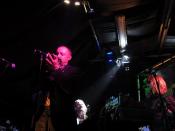The Webster's New Collegiate defines a scientist as: One learned in science or Natural science; also know as a scientific investigator. The Dr. Faust described in Marlow's Faust defiantly fits all of these criteria. He was very learned (or so he thought) in all the different sciences. In here lies his problem, Faust said that he is boarded or sees no reason for analysis, physics, law and divinity (lines 5-60). It is possible that Faust could be looking for a new more interesting science. Therefore because he is constantly searching for more knowledge, under these guidelines, he is defiantly a scientist. It is important to note that unlike most scientists, Faust is not searching for knowledge just to better himself. He is only interested in more knowledge because it produces more power; and power is Faust's main goal.
More evidence that Dr. Faust is a scientist lies with in Act 2.
This is the act where Faust finally sells his soul and the second thing he asks for are the tools of scientist, books. The first book he wants is a book that "behold(s) all spells and incantations"(lines 161). He asks for this one first because it beholds more power for him while the books he asks for after this are more for the learned aspect of Faust personality. These other books he now wants that allow him to " see all the characters and planets of the heaven" and "(to) see all plants, herbs and trees that grow upon the earth" (lines 165 and168). These last two books provide no direct means for power, unlike the first book of spells. The fact that he does ask for these last two purely intellectual books provide more proof that he is indeed a scientist.
Dr. Faust would of found himself at home in the Royal Society for the improving Natural Knowledge. This is true for two reasons: first because he was very interested learning about new sciences, even if he did it for his own needs. He repeats his constant search for more information when he questions the seven deadly sins (lines 105-163). Here he continues to feed his scientific appetites by cross-examine and classifying the sins.
Secondly, Faust would be part of this society because like the rest of the society he believed that science and religion is intertwined. Proof that he believes this lies in the fact that he uses religious applications to increase his knowledge. Much like the member of society who believed that religion and science were intertwined. They thought that science only enhanced "the Glory of god" (pg 2040). They that they were not trying to disprove god, which was the fear of some clergyman and politicians. Thought Faust used this in reverse (using religion to improve science) it is the same idea that religion and science are combined.
On the other hand Faust didn't really believe that there was heaven and hell even when the truth was told to him, which a major fault Faust has as a scientist. Mephostophilis told Faust that "hell hath no limits" but still he doesn't not believe what he is told because he is blinded power. This is another example of how Faust is a very bad scientist because he only believes what he wants to believe and this makes him a warped. In this way he would not be a very good member of the royal society.
Faust is defiantly a scientist because he is a scientific investigator and literally sells his soul for more knowledge, even if that knowledge is tainted with his inexhaustible craving for power. Some of the scientist from the Royal Society for the improving Natural Knowledge would approve of some of Faust actions, because he was perusing knowledge of science. Still at the heart of his search for knowledge is that Faust's undying want power that makes him ignore vital bits information. Though he is a scientist by the true definition of the word; his power lust makes him not a very good one. In conclusion, Faust would most heartily believe in the saying; "That Knowledge is power" and would defiantly be a scientist in his mind as well as some of those personages in the Royal Society for the improving Natural Knowledge.

